2017 Lunch Lectures

"Machine Learning for Sensor Data Analysis in HCI"
Speaker: Thomas Ploetz
Date: 2017-11-30 12:00:00
Location: TSRB
ABSTRACT
Many contemporary systems in human computer interaction (HCI) including mobile and ubiquitous computing are based on some form of automated sensor data analysis. Prominent examples are innovative and more intuitive input modalities such as voice and gesture, or automated activity logging and analysis. It is fair to conclude that sensor data analysis is key to context aware computing as a whole. Such prominence requires robust and reliable methods that can cope with the challenges of real-world HCI applications and systems, of which there are many: Noisy sensor readings; often ambiguous, sometimes erroneous ground truth annotation (labeling); small datasets that can be used for method development; hard real-time constraints for analysis; etc. As a key component of sensor data analysis in HCI (and beyond) many researchers have moved towards employing machine learning techniques, especially those related to the automated analysis of time-series data as they are recorded through the multitude of sensors used in HCI. In recent years the field of machine learning has seen an explosion in growth and very sophisticated methods now do exist that are key enablers for a plethora of application areas. Most appealing to many practitioners is the availability of toolkits such as Matlab, Weka, scikit-learn, and the various deep learning frameworks to name but a few, that nicely package machine learning methods. These toolkits effectively hide the complexity of machine learning methods - which, I argue, is both a blessing and a curse. Packaging away complex functionality is common practice in, for example, software engineering where libraries with clear interface specifications provide higher level functionality to practitioners. To some extent machine learning toolkits provide similar functionalities and as such make these methods accessible to practitioners in the first place. Yet, hiding the complexity of machine learning can be dangerous. Without careful considerations of appropriateness of methods for specific problems beyond the mere interface fit of the chosen toolkit, practitioners are at risk of falling victim to flaky conclusions.
In this talk I will advocate the enormous potential machine learning methods have for current and next generations of HCI applications and systems - specifically targeting time-series assessment as it is most common for HCI related sensor data analysis problems. In doing so I will focus on common pitfalls that a utilitarian use of machine learning methods inevitably brings - and will offer ways to avoid these.
SPEAKER BIO
Thomas Ploetz is a Computer Scientist with expertise and almost 15 years experience in Pattern Recognition and Machine Learning research (PhD from Bielefeld University, Germany). His research agenda focuses on applied machine learning, that is developing systems and innovative sensor data analysis methods for real world applications. Primary application domain for his work is computational behavior analysis where he develops methods for automated and objective behavior assessments in naturalistic environments. Main driving functions for his work are "in the wild" deployments and as such the development of systems and methods that have a real impact on people's lives.
Thomas has “recently” (February 2017) joined the School of Interactive Computing where he works as an Associate Professor of Computing. Prior to this he was an academic at the School of Computing Science at Newcastle University in Newcastle upon Tyne, UK, where he was a Reader (Assoc. Prof.) for "Computational Behaviour Analysis" affiliated with Open Lab, Newcastle's interdisciplinary research centre for cross-disciplinary research in digital technologies.
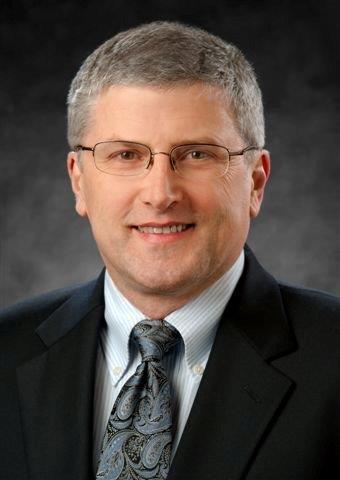
"Bridging Public Health and Technology - Why Innovation Matters"
Speaker: Brian Lee
Date: 2017-11-16 17:03:00
Location: TSRB
ABSTRACT
Leveraging the power of data
The factors affecting our health are wide-ranging, from inefficient or underfunded systems, to new and changing health threats, to natural disasters, bioterrorism, access to healthcare, and the growing burden of noncommunicable diseases. Public health, like computer science, is about solving problems. In fact, the role of public health is to evaluate problems on a population level rather than on patient level and to make diagnoses in terms of the problems in the community rather than for an individual patient.
Data are one of CDC's most powerful tools to assess this critical, top-level view of the public's health. The data we collect can not only send signals to help us spot threats from known and unknown infectious diseases, including AIDS, hantavirus, Ebola virus, and Zika, but it can also track opioid overdoses, suicides, chronic conditions, lead poisoning, tobacco use, and much more. Discoveries derived from CDC's 100 plus surveillance systems connect data across diseases and conditions thanks to information gathered from 3,000 agencies at the federal, state, local, and territorial levels.
Health IT's new frontier-Innovation in Public Health
As the role of public health in our nation's health care system is broadening and overlapping, we now have more connectivity than ever before. What used to be the domain of public health is now shared by fellow problem-solvers wanting to use their skills and tools to improve health. Computer search engines, social media, apps, and other wearables are contributing to new data streams. Much of this technology was not designed to track health, but is the byproduct of the ubiquity of innovation-and innovation must be a part of the public health landscape as well.
Public health is a great source of data and knows how to connect data. But we need to work together to make that data useful in real time and in the real world. As CDC makes strides in modernizing our surveillance systems and approaches to data collection, we need new ideas, flexibility, and readiness to connect across disciplines. We need a new generation of innovators with the skills to ensure our essential public health role works well in the new landscape. In short: we need people like you. So the question is, how can we work together to make sure public health innovates in the most strategic way for the future?
SPEAKER BIO
Chesley Richards is Deputy Director for Public Health Scientific Services at CDC, as well as the Director of the Office of Public Health Scientific Services. In these two roles, Dr. Richards is a key advisor to the CDC Director and oversees the National Center for Health Statistics (NCHS) and the Center for Surveillance, Epidemiology and Laboratory Services (CSELS) with activities that include the MMWR, Vital Signs publications, the Epidemic Intelligence Service and other scientific training programs, the Guide to Community Preventive Services, and a broad range of cross cutting epidemiology, public health surveillance, and laboratory services. Dr. Richards earned his M.D. from the Medical University of South Carolina, an M.P.H. in Health Policy and Administration from University of North Carolina at Chapel Hill and is a graduate of the Epidemic Intelligence Service (EIS) at CDC, the Cancer Control Education Fellowship at UNC Lineberger Cancer Center and the Program on Clinical Effectiveness at Harvard School of Public Health. He completed Internal Medicine (Medical College of Georgia), Geriatric Medicine (Emory University) and General Preventive Medicine and Public Health (UNC Chapel Hill).
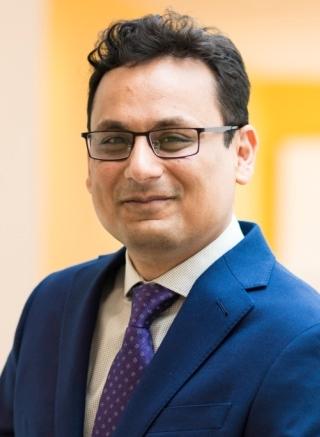
"Can a Computer Improve Your Social Skills?"
Speaker: Ehsan Hoque
Date: 2017-11-09 12:00:00
Location: TSRB
ABSTRACT
Many people fear automation. They may see it as a potential job killer. They may also be concerned about what can be automated. Could we train a computer to teach us human skills? Should we? Artificial intelligence, when designed properly, can help people improve important social and cognitive skills. My research group has shown how automated systems can develop skills that improve performance in job interviews, public speaking, negotiations, working as part of a team, producing vowels during music training, end-of-life communication between oncologists and cancer patients, and even routine social interactions for people with Asperger's syndrome. In this talk, I will offer insights gained from our exploration of several questions: How are humans able to improve important social and cognitive skills with a computer? What aspect of the feedback helps the most? How to design experiments to ensure that the skills generalize?
SPEAKER BIO
M. Ehsan Hoque is an assistant professor of computer science and an Asaro-Biggar (‘92) Family Fellow in Data Science at the University of Rochester, where he leads the Rochester Human-Computer Interaction (ROC HCI) Group. His group's research focuses on understanding and modeling the unwritten rules of human communication, with applications in business communication, health, and educational assessment technology. Ehsan earned his Ph.D. in the MIT Media Lab in 2013, where his dissertation was highlighted by the MIT Museum as one of the most unconventional inventions at MIT. Ehsan and his group's work has earned them a Best Paper Award at the ACM Conference on Pervasive and Ubiquitous Computing (UbiComp, 2013), as well as Best Paper Honorable Mentions at the Affective Computing and Intelligent Interaction (ACII, 2017), Automated Face and Gesture Recognition (FG, 2011) and Intelligent Virtual Agents (IVA, 2006). Ehsan has received an MIT TR35 (2016), a World Technology Award (2016), and two Google Faculty Research Awards (2014, 2016). In 2017, Science News recognized him as one of 10 early-to mid-career scientists to watch (the “SN 10”).
Follow the ROC HCI group's work on Twitter at @rochci.

"Can Healthcare Become an iPhone?"
Speaker: Mark Braunstein
Date: 2017-11-02 12:00:00
Location: TSRB
ABSTRACT
The hidden secret of smartphones is their API that makes the phone's sensors and data accessible and thereby facilitates app development on a global scale. The healthcare informatics community has long dreamed of something similar in which the underlying platform is the electronic health record. Seemingly unobtainable only a few years ago and almost by magic this is exactly what's happening and Georgia Tech has gained a leadership position. This talk tells the story and provides information on how attendees can get into the game.
SPEAKER
Dr. Mark Braunstein is a professor of health informatics for the School of Interactive Computing in the College of Computing at the Georgia Institute of Technology. He serves as the associate director for Health Systems at Georgia Tech's Institute for People and Technology, which fosters interdisciplinary research and instruction to re-engineer the healthcare delivery system, and he also sits as the associate editor of the Institute of Electrical and Electronics Engineers' (IEEE)Journal of Biomedical and Health Informatics. The author of “Practitioners Guide to Health Informatics: a guide to health informatics for physicians and other non-technical readers” and "Contemporary Health Informatics," published by Springer and the American Medical Informatics Association in 2015 and 2014 respectively, he aids in research that involves healthcare process mining at the Tennenbaum Institute. Furthermore, at the Interoperability and Integration Innovation Lab (I3L), he is involved in community and industry outreach projects with lab partners to improve the quality and efficiency of health care delivery.
(No video available)
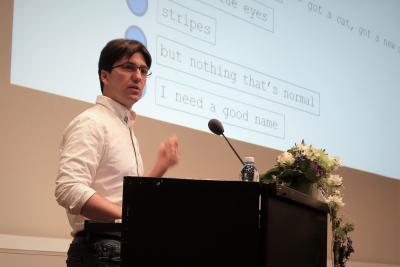
"Learning About Personal Experiences & Their Outcomes: Analyzing Social Media as an Observational Study"
Speaker: Emre Kiciman
Date: 2017-10-26 12:00:00
Location: TSRB
ABSTRACT
For years now, millions of people share details about their real-world experiences on social media, including Twitter, LinkedIn, and Reddit. Using causal inference methods, we can data mine these social media streams to better understand the common and critical situations people are in, the actions they take, and their outcomes. Such inferences may be useful for many applications including decision support tools for individuals and analytics to support policy-makers and scientists. Over the last several years, we have performed several studies across a wide-variety of domains, including health, exercise, education and careers. In this talk, I describe some of the challenges and promises of extracting and interpreting potential causal relationships in the conversational space of social media, and the growing landscape of research in causal inference over social media datasets.
SPEAKER BIO
Emre Kiciman is a Principal Researcher at Microsoft Research AI. His current work focuses on causal analysis of large-scale social media timelines. Emre's past research projects include social computing and search technologies, deployed in Bing; and foundational work applying machine learning to fault management in large-scale internet services, now an industry standard practice. He has over 50 publications, and 18 granted patents. Emre received his PhD in Computer Science from Stanford University, and BS in Electrical Engineering and Computer Science from UC Berkeley.
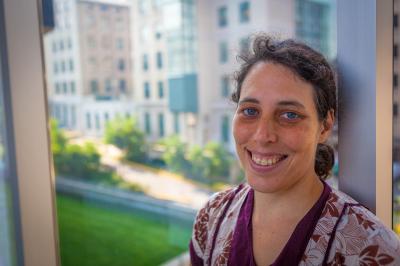
Distinguished Alumna Brown Bag Seminar: "Fabricating Accessibility"
Speaker: Jennifer Mankoff
Date: 2017-10-19 12:00:00
Location: TSRB
ABSTRACT
With the increasing power and flexibility of technologies available to consumers, we are seeing a revolution in how assistive technology (AT) is being created and by whom. This talk will highlight the potential of these technologies for people with disabilities, as well as the challenges that end users face in leveraging them effectively to address AT issues. I will touch on issues around process, materials, design and followup. In each case, there are a host of open problems that can benefit from computational methods and better tools.
SPEAKER BIO
Jennifer Mankoff is the Ladner Professor in the Allen School of Computer Science & Engineering at the University of Washington. Her research areas include HCI, Fabrication, Ubicomp, and Accessibility. Jennifer applies a human-centered perspective to data-driven applications by combining empirical methods and technical innovation to solve pressing social problems in areas such as accessibility, health and sustainability. Integrating computational approaches with human-centered analytics, she develops tools that can influence energy saving behavior, provide support for individuals with chronic illnesses and design 3D-printed assistive technologies for people with disabilities. Jennifer received her PhD at Georgia Tech, advised by Gregory Abowd and Scott Hudson, and her B.A. from Oberlin College. Her previous faculty positions include UC Berkeley's EECS department and Carnegie Mellon's HCI Institute. Jennifer has been recognized with an Alfred P. Sloan Fellowship, IBM Faculty Fellowship and Best Paper awards from ASSETS, CHI and Mobile HCI. Some supporters of her research include Autodesk, Google Inc., the Intel Corporation, IBM, Hewlett-Packard, Microsoft Corporation and the National Science Foundation.

"Disrupt Education or Make It Better? The Rhetoric & Implementation of Educational Technology"
Speaker: Karen Head & Mark Guzdial
Date: 2017-10-12 12:00:00
Location: TSRB
Abstract:
Karen Head's book Disrupt This!: MOOCs and the Promises of Technology (UPNE, 2017) employs a rhetorical lens to deconstruct and analyze some of the arguments and vision statements found in early texts advocating for the disruption of higher education through technology. Head considers what the authors are saying, what they are leaving unsaid, and how their choices of each are meant to influence colleagues, policy-makers, and the public. She highlights the critical questions of who is influencing education, with what expertise, and to what end-that is, she poses the question: Is our goal to simply tip over the apple cart and disrupt education, or is to make it better?
Mark Guzdial's research explores one of the important themes in Head's work-that we will make the most progress in improving education by combining expertise in education, in technology, and in specific disciplines. We do not teach effectively in Communications, History, Engineering, or Computing in exactly the same way. To design educational technology that helps students learn, we have to collaborate across our disciplinary silos and be successful at the individual level before we attempt scale.
Speaker Bios:
Karen Head is Executive Director of the Communication Center at the Georgia Institute of Technology, as well as the Associate Chair and Associate Professor in the School of Literature, Media, and Communication. Since 2006, she has been a Visiting Scholar at Technische Universität-Dortmund, Germany, where she serves as the primary consultant for their academic center. Her research areas focus on writing and communication theory and pedagogical practice, especially in the following areas: higher education rhetoric, sustainable and innovative pedagogy and space design implementation, development of writing centers, writing program administration, communication ecologies, technical communication, business communication, multidisciplinary communication, and creative writing.
Her book Disrupt This!: MOOCs and the Promises of Technology (University Press of New England, 2017) describes her experience teaching a MOOC and the attendant pressure on professors, especially those in the humanities, to embrace new technologies in the STEM era. She has also published four books of poetry, co-edited the poetry anthology about teaching, and has exhibited several acclaimed digital poetry projects.
Mark Guzdial is a Professor in the School of Interactive Computing in the College of Computing at Georgia Institute of Technology. He studies how people come to understand computing and how to make that more effective. He leads the CSLearning4U project to create ebooks to help high school teachers and students learn CS. He is one of the leaders on the NSF alliance “Expanding Computing Education Pathways" which helps US states improve and broaden their computing education. With his wife and colleague, Barbara Ericson, he received the 2010 ACM Karl V. Karlstrom Outstanding Educator award. He is an ACM Distinguished Educator and a Fellow of the ACM.
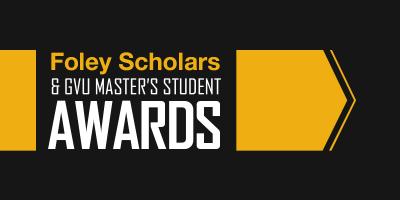
"ACCelerate Preview & Transformative Work in Computing -- Foley Scholars Research"
Speaker: Foley Scholars
Date: 2017-10-05 12:00:00
Location: TSRB
Come early ahead of the seminar for a preview of juried projects heading to the ACCelerate Creativity and Innovation Festival taking place Oct. 13-15, 2017, at the Smithsonian National Museum of American History in Washington, DC.
Oct. 5 ACCelerate Project: Rib Cage
RIB CAGE is an electro-acoustic instrument that incorporates elements of robotics. This instrument is designed to explore the relationship between human and robot co-performing in a single instrument.
Seminar Abstracts:
Mariam Asad
PhD Student, Digital Media
Prefigurative Design: Exploring An Alternate Model for Civic Engagement
This talk discusses a design research orientation called prefigurative design, which I frame as useful for design work around political or civic aims. In prefigurative design, design work does not only articulate or represent certain goals as design objects, but also structures design processes to do the work of actualizing those same goals. This talk will discuss what prefigurative design looks like in HCI research and how we can use prefigurative design to explore and experiment with civic interactions.
Maia Jacobs
PhD Student, Human Centered Computing
Designing Personalized and Adaptive Support for Cancer Patients
When managing cancer, people encounter many physical, emotional, social, and logistical challenges that impede on their quality of life and their ability to effectively manage their health. Helping people overcome these barriers is challenging, as the issues they face are not only broad, but also dynamic, changing over time. Timely access to health information can significantly improve a person's illness management and quality of life, but often people feel under-informed or unable to find the necessary information. In this talk I present MyPath, an application that connects breast cancer patients to personalized, adaptive, and trusted health information. I also discuss results from the MyPath field study, which demonstrate how personalized health information can encourage active engagement in one's health management.
Clint Zeagler
PhD Student, Human Centered Computing
Bridging the Gap: Aiding Designers in Creating Wearable Technology
Although much of my work and my dissertation focuses on usability aspects of wearable technology dealing with human factors. I will be presenting on recent work that makes the technology side of wearable technology easier to incorporate in the process of designers. I will also illuminate a case studies with artists that showcase using these efforts to make wearable technology design accessible to a wider array of disciplines. I will highlight new tools available from my research such at the Wearable Technology Body Maps that include design and accessibility considerations for on-body location of devices and technology.
Speaker Bios:
Mariam Asad is a PhD student in the Digital Media program at Georgia Tech. Her work focuses on activism, design, and social justice. She is interested in the different ways that different Atlanta communities discuss, use, and appropriate technologies to do political work. She explores how technology design can offer opportunities for civic participation through both policy- and grassroots/community-based initiatives.
Maia Jacobs is completing her PhD in Human Centered Computing at Georgia Tech, advised by Elizabeth Mynatt. Jacobs' research contributes to the fields of ubiquitous computing and personal health informatics through the development and assessment of novel approaches for mobile health tools to support chronic disease management. Her evaluations of these systems provide scientific evidence that interactions with personal health tools positively influence healthcare experiences and impact health outcomes. Jacobs' research has gained national attention, having recently been recognized in the 2016 report to the President of the United States from the President's Cancer Panel, which focuses on improving cancer-related outcomes.
Clint Zeagler is a PhD student in Human-Centered Computing and is advised by Melody Jackson. Zeagler is also a Research Scientist II for the Interactive Media Technology Center and Program Manager of the Wearable Computing Center. He is a designer and researcher of wearable technology and interested in how to create wearable technology that is both usable and useful. Making wearable technology usable involves empirical usability studies to show how a person might interact with technology on the body. Zeagler's previous work in textile based on-body interfaces is an example of the types of usability studies he has overseen. “Is it Gropable” was one such study about how well a person could interact with capacitive sensitive raised embroidered interfaces without visual attention. Other usability and technical material studies followed developing new textile interactions and testing the limitations of manufacturing materials and process. Making wearable technology useful involves working with designers and giving them tools they can use to create wearable technology. Some of these tools are outlined in his paper on the “Electronic Textile Interface Swatch Book” and his recent paper “Where to Wear It” about a collection of guidelines and Body Maps to aid designers in choices about on-body location of technology.
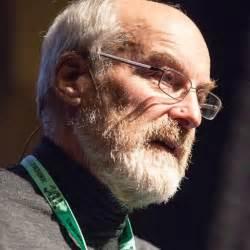
"Complexity and Distributed Ethnography"
Speaker: Dave Snowden
Date: 2017-09-28 12:00:00
Location: TSRB
Come early ahead of the seminar for a preview of juried projects heading to the ACCelerate Creativity and Innovation Festival taking place Oct. 13-15, 2017, at the Smithsonian National Museum of American History in Washington, DC.
Sept. 28 ACCelerate Project: Creative Collisions
Georgia Tech technologists collaborated with artist Katherine H. Fisher to build an interactive garment that engages audience participation in her performance piece Characters.
Seminar Abstract:
Complexity theory has been described as the science of inherent uncertainty. It deals with systems where we can understand the dispositional state, the ways the system might evolve, but about which we can make no predictive statements. From applications on biology and physics the science is increasingly been applied to understand social systems. One of the new emerging techniques, which builds on longitudinal research, action research, narrative theory and ethnography, is the continuous real time capture of self-interpreted micro-narratives/observations. Originally developed in the context of weak signal detection the approach has now been developed into a range of novel applications of relevant to society. These include: (1) Real time citizen engagement in which students act as ethnographers to their own communities. In one project in Asia 50k narratives were gathered in a week, self interpreted at the point of original to create a cultural map of the society as a whole. (2) Mapping student attitudes on enrollment, but then on a continuous basis with the ability to identity early signs of excessive stress, bullying, etc. Lessons learned have supported early intervention at low cost as opposed to reactive approaches at high cost. (3) As a new research technique that radically reduces cultural and expert bias and allows the research to focus on interpretation and theory creation rather than tagging. This seminar will introduce the basics of complexity theory in human systems, looking at the implications for practice and ethics. It will also provide an overview of distributed ethnographic tools.
Speaker Bio:
Dave Snowden is the founder and chief scientific officer of Cognitive Edge. His work is international in nature and covers government and industry looking at complex issues relating to strategy, organisational decision making and decision making. He has pioneered a science based approach to organisations drawing on anthropology, neuroscience and complex adaptive systems theory. Snowden worked for Data Sciences Ltd from 1984 until January 1997. The company was acquired by IBM in 1996 and the following year he joined IBM Global Services' Knowledge and Differentiation Programme. While at IBM Snowden researched the importance of storytelling within organizations, particularly in relation to expressing tacit knowledge. In 2000 he became European director of the company's Institute for Knowledge Management,an d in 2002 he founded the IBM Cynefin Centre for Organisational Complexity. Snowden left IBM in 2004 and a year later founded Cognitive Edge Pte Ltd, a management-consulting firm based in Singapore. As of 2016 he is an associate professor extraordinaire at the University of Stellenbosch Business School, and an honorary professor in the school of psychology at Bangor University.

"The Mechanics of Leveraging and Running the Largest Science Forum on the Web"
Speaker: Jennifer (Piper) Below
Date: 2017-09-21 12:00:00
Location: TSRB
Come early ahead of the seminar for a preview of juried projects heading to the ACCelerate Creativity and Innovation Festival taking place Oct. 13-15, 2017, at the Smithsonian National Museum of American History in Washington, DC.
Sept. 21 ACCelerate Project: LuminAI
LuminAI is a dome-based art installation in which participants can engage in collaborative movement improvisation with each other and virtual AI-based dance partners.
Seminar Abstract:
Science communication has evolved rapidly in the past decade; 18-25 year olds do not engage with traditional media in the same way as previous generations. As a result, scientists must go to where the learners are or we cede the audience to click-bait pop science, pseudoscience, and science deniers by default. The majority of online resources for self-directed scientific inquiry are non-interactive presentations of information. With a goal of democratizing science education and facilitating engagement between scientific leaders and the general lay public (who fund the majority of their research), I am a full moderator (one of ~10) of the scientific community /r/science on reddit.com. r/science utilizes internet-based computer-supported cooperative work that includes an “Army” of over 1400 volunteer moderators to allow focused, on-topic discussion of new peer reviewed research science in a public space. This forum for scientific communication also organizes and provides a platform for bidirectional, crowd-sourced conversations with prominent research scientists, has nearly 18 million subscribed readers, and receives between 100k-500k unique IP page views per day. In this endeavor, I work daily with major scientific and media publishing houses, such as AAAS, Nature Publishing Group, Cell Press, the American Chemical Society, NPR, Washington Post, NASA, and PLOS to facilitate communication of discoveries and promote research. We actively collaborate with members of MIT's Media Lab and others to evaluate our engagement, and are expanding our outreach to leverage the educational opportunities of /r/science with a focus on divisive issues such as transgender health and online radicalization.
Speaker Bio:
In my day job as an assistant professor of Medical Genetics at Vanderbilt University Medical Center, I am interested in developing and applying computational methodologies to further our understanding of the genetic basis of human disease. Specifically, I focus on development of novel strategies for identifying and confirming genetic risk factors to complex traits including blood lipid levels, diabetes, obesity, Alzheimer's disease, cardiovascular disease, and metabolic traits via ascertainment of dense genetic (specifically, whole genome/exome sequenced and whole genome imputed datasets) and phenotypic data.
Outside of genetics, digital era science education and outreach is one of my passions. I am a full moderator (one of ~10) of the scientific community /r/science onreddit.com. This community-run forum for scientific communication facilitates bidirectional crowd-sourced interviews with prominent research scientists, has nearly 18 million subscribed readers, and receives between 100k-500k unique IP page views per day.
Video is not available for this event.

"WebXR, WebVR, and the Democratization of Mixed Reality"
Speaker: Blair MacIntyre
Date: 2017-09-14 12:00:00
Location: TSRB
Come early ahead of the seminar for a preview of juried projects heading to the ACCelerate Creativity and Innovation Festival taking place Oct. 13-15, 2017, at the Smithsonian National Museum of American History in Washington, DC.
Sept. 14 ACCelerate Project: Electrocet
The Electrocet project started with the idea that you shouldn't have to buy a sports car or an electric vehicle or a commuter car - there should be a car that can excel in all driving scenarios, just by selecting the right drive mode.
Seminar Topic Abstract:
At Georgia Tech, we started the Argon project back in 2009 to explore the idea of integrating Augmented Reality (AR) technology into mobile web browsers, and letting web developers create AR experiences without the need to build and ship mobile applications. This past September, we shipped Argon4, the fourth version of the Argon AR-enabled web browser for iOS, and open-sourced the argon.js framework at https://argonjs.io. The design of Argon4 and argon.js is based on a set of principles we have developed to support the creation and delivery of AR experiences in a heterogeneous ecosystem of interaction and display devices and AR sensing technologies. Argon's design is aimed at allowing users to run multiple independently authored AR experiences at once, using different representations of reality as the backdrop for these applications, putting the user in control of when and how they interact with AR content.
At Mozilla, we led the design and development of WebVR over the past few years, and last month shipped the first implementation of WebVR 1.1 in Firefox. We are building on our experience with WebVR and what I've learned in the Argon project to expand the design of WebVR to include the breadth of Mixed, Augmented and Virtual Reality.
We are developing these ideas as WebXR, an open-source framework for cross platform, “reality based” experiences, that also serves as a proposal for doing web-based MR. This work is in the experimental stage, being done in the Emerging Technologies group as part of a larger set of projects aimed at making the Web the ideal platform for MR experiences large and small. We want to bring the best characteristics of the Web to these new 3D paradigms, making AR, VR and MR open and accessible to all, not just as consumers but as creators as well.
Speaker Bio:
Blair MacIntyre is a Principal Research Scientist at Mozilla and a Professor in the School of Interactive Computing at the Georgia Institute of Technology, where he has directed the Augmented Environments Lab since 1999. His research focuses on developing the potential of augmented reality as a novel technology and new medium for games, entertainment, education and work. Since 2008 he has directed the Argon project to explore the potential of the web as a platform for Augmented Reality, and is currently working on Mixed Reality in the Emerging Technologies group at Mozilla to bring this vision of Web-based AR to life. He has published more than 100 research papers, is actively involved with industry as a consultant and speaks regularly about augmented reality, games and mobile technology.
Video not available.
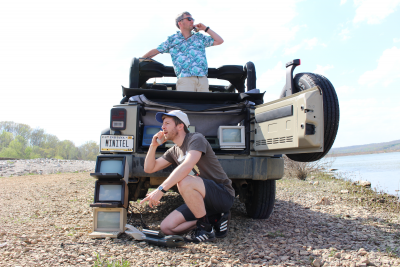
"Platforms in the Public Interest: Lessons from Minitel"
Speaker: Julien Mailland & Kevin Driscoll
Date: 2017-09-07 12:00:00
Location: TSRB
Abstract:
Platforms such as Facebook predominate cyberspace today, providing private infrastructures for public culture. These systems are so massive that it's easy to forget that the digital world was not always like this. More than two decades before widespread Internet access, millions of people in France were already online, chatting, gaming, buying, selling, searching, and flirting. This explosion of digital culture came via Minitel, a simple video terminal provided for free to anyone with a telephone line. After thirty years in service, Minitel offers a wealth of data for thinking about internet policy and an alternative model for the internet's future: a public platform for private innovation.
Speaker Bios:
Julien Mailland studies telecommunications networks design, law, and policy through the lens of history. He is an assistant professor of telecommunications at Indiana University's Media School, a research associate with the Computer History Museum Internet History Program, and a lawyer with the fintech industry. Kevin Driscoll studies popular culture and computing. His research builds alternative models for platform governance and online community from the internet of the 1980s and 1990s. Recent projects examine dial-up BBSs in the US and Minitel in France. Kevin is an assistant professor of media studies at the University of Virginia.
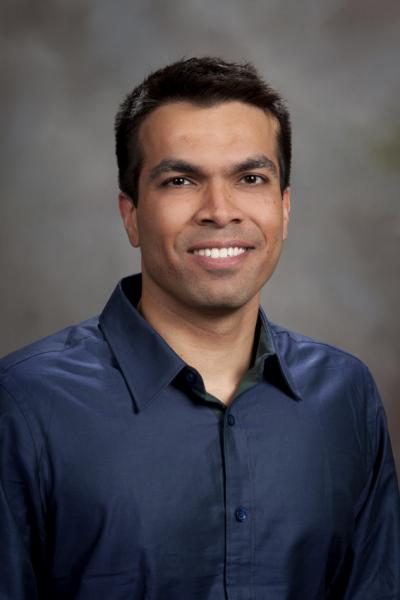
"Visual Dialog: Towards AI Agents That Can See, Talk, and Act"
Speaker: Dhruv Batra
Date: 2017-08-31 12:00:00
Location: TSRB
Abstract:
We are witnessing unprecedented advances in computer vision and artificial intelligence (AI). What lies next for AI? We believe that the next generation of intelligent systems (say the next generation of Google's Assistant, Facebook's M, Apple's Siri, Amazon's Alexa) will need to posses the ability to `perceive' their environment (through vision, audition, or other sensors), `communicate' (i.e., hold a natural language dialog with humans and other agents), and `act' (e.g., aid humans by executing API calls or commands in a virtual or embodied environment), for tasks such as:
Aiding visually impaired users in understanding their surroundings or social media content (AI: ‘John just uploaded a picture from his vacation in Hawaii', Human: ‘Great, is he at the beach?', AI: ‘No, on a mountain')
Aiding analysts in making decisions based on large quantities of surveillance data (Human: ‘Did anyone enter this room last week?', AI: ‘Yes, 27 instances logged on camera', Human: ‘Were any of them carrying a black bag?'),
Interacting with an AI assistant (Human: ‘Alexa – can you see the baby in the baby monitor?', AI: ‘Yes, I can', Human: ‘Is he sleeping or playing?').
Robotics applications (e.g. search and rescue missions) where the operator may be ‘situationally blind' and operating via language (Human: ‘Is there smoke in any room around you?', AI: ‘Yes, in one room', Human: ‘Go there and look for people').
In this talk, I will present a range of projects from my lab (some in collaboration with Prof. Devi Parikh's lab) towards building such visually grounded conversational agents.
Speaker Bio:
Dhruv Batra is an Assistant Professor in the School of Interactive Computing at Georgia Tech and a Research Scientist at Facebook AI Research (FAIR). His research interests lie at the intersection of machine learning, computer vision, and artificial intelligence, with a focus on developing intelligent systems that are able to concisely summarize their beliefs about the world with diverse predictions, integrate information and beliefs across different sub-components or `modules' of AI (vision, language, reasoning, dialog), and interpretable AI systems that provide explanations and justifications for why they believe what they believe. In past, he has also worked on topics such as interactive co-segmentation of large image collections, human body pose estimation, action recognition, depth estimation, and distributed optimization for inference and learning in probabilistic graphical models.
He is a recipient of the Office of Naval Research (ONR) Young Investigator Program (YIP) award (2016), the National Science Foundation (NSF) CAREER award (2014), Army Research Office (ARO) Young Investigator Program (YIP) award (2014), Virginia Tech College of Engineering Outstanding New Assistant Professor award (2015), two Google Faculty Research Awards (2013, 2015), Amazon Academic Research award (2016), Carnegie Mellon Dean's Fellowship (2007), and several teaching commendations at Virginia Tech. His research is supported by NSF, ARO, ARL, ONR, DARPA, Amazon, Google, Microsoft, and NVIDIA. Research from his lab has been featured in Bloomberg Business, The Boston Globe, MIT Technology Review, Newsweek, WVTF Radio IQ, and a number of popular press magazines and newspapers. From 2013-2016, he was an Assistant Professor in the Bradley Department of Electrical and Computer Engineering at Virginia Tech, where he led the VT Machine Learning & Perception group and was a member of the Virginia Center for Autonomous Systems (VaCAS) and the VT Discovery Analytics Center (DAC). From 2010-2012, he was a Research Assistant Professor at Toyota Technological Institute at Chicago (TTIC), a philanthropically endowed academic computer science institute located on the University of Chicago campus.
He received his M.S. and Ph.D. degrees from Carnegie Mellon University in 2007 and 2010 respectively, advised by Tsuhan Chen. In past, he has held visiting positions at the Machine Learning Department at CMU, CSAIL MIT, Microsoft Research, and Facebook AI Research.
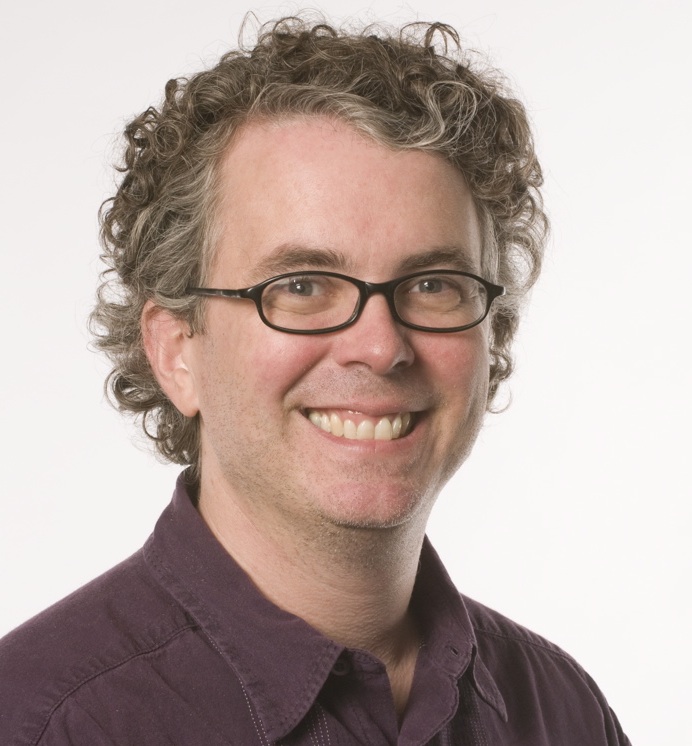
"GVU Center Overview and Funded Research Projects"
Speaker: Keith Edwards
Date: 2017-08-24 12:00:00
Location: TSRB
Abstract:
In the first GVU Brown Bag Seminar of the academic year, Keith Edwards, GVU Center Director and Professor of Interactive Computing, will kick off our talk series with an overview of the GVU Center detailing its unique resources and opportunities, and previewing some of the events coming up this semester. Come, enjoy lunch, and learn about some of the ways you can connect with GVU.
Also, each year, the GVU Center and IPaT announce funding for the Research and Engagement Grants, which support early stage work by Georgia Tech researchers. This year's winners will give brief overviews of the work they will be doing over the coming academic year. Following the brown bag talk, stick around for our fall ice cream social.
Speaker Bio:
Keith Edwards is a Professor in the College of Computing at Georgia Tech and Director of the GVU Center. His research interests focus primarily on driving human-centered concerns into core computing infrastructure. He is a pioneer in the exploration of human-centered perspectives on computer networking, particularly in the home and has been active in developing more usable approaches to information security systems. Lately, his research has expanded into a number of explorations of the social impacts of computing technology, and understanding how technology can support the work of non-profits and NGOs. While he is a technologist at heart, he enjoys working with designers, as well as ethnographers and other social scientists.

"Designing the Infrastructures of Digital Civics"
Speaker: Christopher Le Dantec
Date: 2017-04-13 16:00:00
Location: TRSB
Abstract:
Smart cities and digital democracy have begun to converge and create opportunities to enact a new digital civics. This application of technology to government holds a number of assumptions about government and citizenship, many of which rely on transactional notions of service selection and delivery. This talk addresses how design can support the development of a relational digital civics by recognizing that data are social-whether through the act of collecting them, to marshaling them for argument and advocacy, or by being acted on by them. Building on recent work in participatory design, I argue that designers and research working in community settings are not simply creating end products that make use of data, but are designing publics through the creation, collection, and curation of data-and the processes around which data are produced. These publics are socio-technical articulations that address the different tensions, boundaries, and values present in community contexts and arise in response to issues, form through a range of attachments, and ultimately act through the creation of new socio-technical infrastructures.
Speaker Bio:
Christopher Le Dantec is an Assistant Professor in the Digital Media Program in the School of Literature, Media, and Communication at the Georgia Institute of Technology. His research is focused on the intersection of participatory design, digital democracy, and smart cities-what is now becoming the area of digital civics. He is specifically interested in developing community-based design practices that support new forms of collective action through the production and use of civic data. After earning his Ph.D. in Human-Centered Computing in 2011 from the Georgia Institute of Technology, where he advanced theoretical and practice-based approaches to bridge the digital divide experienced by homeless families in the U.S., he has worked closely with the City of Atlanta and a range of community-based partners to explore new forms of civic participation through community-centered design inquiry. His research has direct impact on how policy makers and citizens work together to address issues of community engagement, social justice, urban transportation and development. In addition to publishing in a range of ACM conferences, he is the Community+Culture forum editor for interactions magazine and the author of Designing Publics (MIT Press).
Video is not available for this event.

"Explorations in the design and use of technology for underserved communities"
Speaker: Ed Cutrell
Date: 2017-04-06 17:30:00
Location: TSRB
Co-Sponsored with the Center for Serve-Learn-Sustain
Abstract:
In 2010 I moved to India to begin working in what was for me a new and exciting area of research, ICT4D (ICTs for global development). Critical to ICT4D research is understanding how the unique context and constraints of developing communities affect the design and goals for systems and technologies, and how these systems are taken up by end users and beneficiaries. Last year, I moved back to the US and began working with another group of users who live with a very different set of constraints: people with disabilities. I have found that research in both areas carries critical lessons for HCI researchers and technology designers. In this talk I will describe three projects that illustrate the importance of understanding the broader context and motivations of the people we're working with. What are their needs and how do we understand if our designs meet them? We'll look at a system for student interactivity in low-resource Indian classrooms; a way to enhance communication technology for people with ALS; and finally, an easy-to-use system for collecting health information to combat childhood malnutrition. In each, I'll talk about some of the lessons learned. To paraphrase Field Marshal Moltke, “No design ever survives first contact with users in the field.”
Speaker Bio:
Ed Cutrell is a senior researcher at Microsoft Research where he explores computing for disability, accessibility, and design with the MSR Ability group. Over the years, he has worked on a broad range of HCI topics, including input tech, visual perception and graphics, intelligent notifications and disruptions, and interfaces for search and personal information management. From 2010-2016, he managed the Technology for Emerging Markets (TEM) group at MSR India, focusing on technologies and systems useful for people living in underserved rural and urban communities in developing countries. Ed has worked in the field of human-computer interaction (HCI) since 2000; he is trained in cognitive neuropsychology, with a PhD from the University of Oregon.
Video is not available for this event.

"The Argon Project, and the Past, Present and Future of Augmented Reality on the Web"
Speakers: Blair MacIntyre, Gheric Speiginer
Date: 2017-03-16 12:00:00
Location: Technology Square Research Building, 1st Floor Ballroom, Atlanta, Ga
Abstract:
We started the Argon project in the Augmented Environments Lab at Georgia Tech back in 2009, to explore the idea of integrating Augmented Reality (AR) technology into mobile web browsers, and letting web developers create AR experiences without the need to build and ship mobile applications. This past September, we shipped Argon4, the fourth version of the Argon AR-enabled web browser for iOS, and open-sourced the argon.js framework at https://argonjs.io. The current design of Argon4 and argon.js is based on a set of principles we have developed to support the creation and delivery of AR experiences in a heterogeneous ecosystem of interaction and display devices and AR sensing technologies. Argon's design is aimed at allowing users to run multiple independently authored AR experiences at once, using different representations of reality as the backdrop for these applications, putting the user in control of when and how they interact with AR content.
In this talk, we will discuss the history and research goals of the Argon project, the architecture and capabilities of the software, and our ongoing research. In addition, late last year Blair MacIntyre joined Mozilla (on leave from GT) to begin an effort to bring AR technology to mainstream web browsers, so we will close this talk with his perspective on the future of AR on the web.
Bio:
As director of the Augmented Environments Lab, Professor Blair MacIntyre's research has focused on the design and implementation of interactive mixed-reality and augmented-reality environments. The current focus of his work is on building web-based tools for delivering educational, entertainment and gaming applications of augmented and mixed reality, especially those that use personal displays to directly augment a user's perception of their environment. He is on leave from Georgia Tech, and is currently a Principal Research Scientist in the Emerging Technologies team at Mozilla, looking at how to integrate AR technologies into modern web browsers. Gheric Speiginer is a PhD Student in Human Centered Computing at Georgia Tech and received his undergraduate degree in Computer Science at Hampton University. Gheric is interested in exploring novel user interfaces and interaction techniques, particularly those that exploit the unique capabilities of augmented reality. His current research focus explores software architectures for AR applications that support heterogeneous displays and user goals, and the use of adaptive user interface concepts in order to address dynamically changing contexts in augmented reality experiences. His research is supported by the NSF GRFP and GEM fellowships. Gheric is a PhD student advised by Dr. Blair MacIntyre in the Augmented Environments Lab at the School of Interactive Computing at Georgia Tech.
Video is not available for this event.
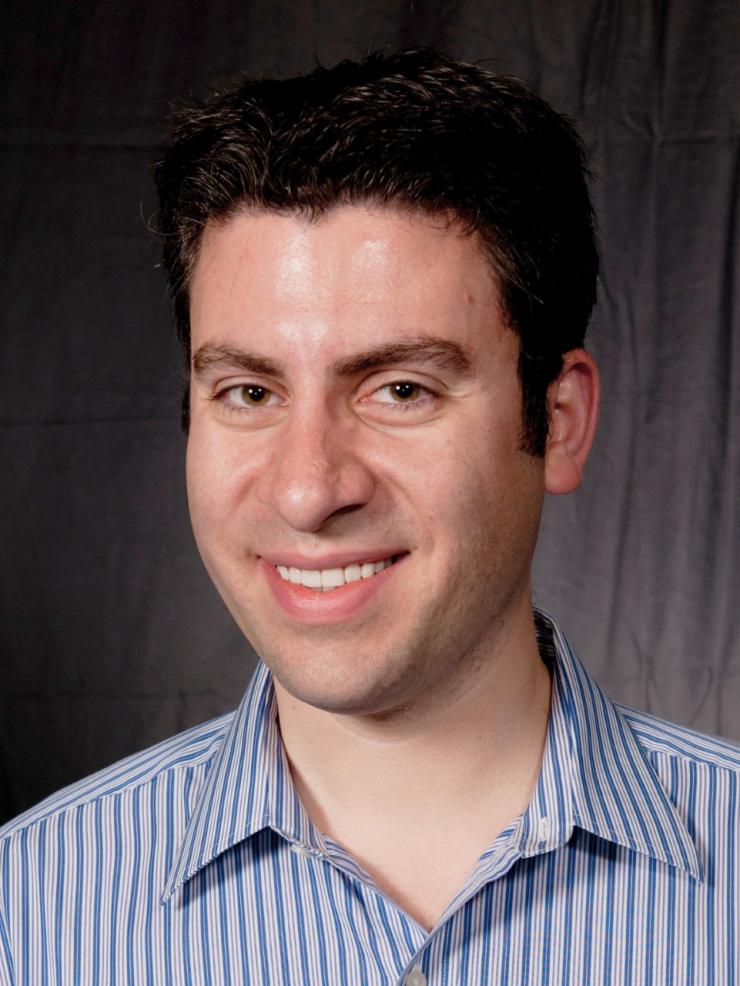
"Digital Humans, Virtual Surgery and Fast Fluids; Do They Have More In Common Than Their Hunger For Performance?"
Speaker: Eftychios Sifakis
Date: 2017-03-09 17:30:00
Location: TSRB ballroom
Abstract:
Physics-based modeling research in graphics has been consistently conscious of advances in modern parallel hardware, leveraging new performance capabilities to improve the scope and scale of simulation techniques. An exciting consequence of such developments is that a number of performance-hungry emerging applications, including computer-aided healthcare and medical training, can now hope to be accommodated in interactive systems. Nevertheless, while large-scale simulation for production-grade visual effects always had the option of clustering compute resources to keep up with growing needs, realtime or near-interactive applications face a more complex set of challenges. In fact, extracting competitive levels of efficiency out of modern parallel platforms is more often than not the result of cross-cutting interventions across the spectrum of theory, modeling, numerics and software engineering.
In this talk I will present a number of examples, mostly drawn from biomechanical modeling, virtual surgery and anatomical simulation tasks, where fresh perspectives on discretization, geometrical modeling, data-parallel programming or even the formulation of the governing PDEs for a physical system were instrumental in boosting parallel efficiency. Finally, I will discuss important lessons learned from simulations of human anatomy, and how those pertain to the design of solvers for computational physics at large, and particularly how they can boost the scale and efficiency of highly detailed fluid dynamics simulations.
Speaker Bio:
Eftychios Sifakis is an Assistant Professor of Computer Sciences and (by courtesy) Mechanical Engineering and Mathematics at the University of Wisconsin-Madison. He obtained his Ph.D. degree in Computer Science (2007) from Stanford University. Between 2007-2010 he was a postdoctoral researcher in the University of California Los Angeles, with a joint appointment in Computer Science and Mathematics. His research focuses on scientific computing, physics based modeling and computer graphics. He is particularly interested in biomechanical modeling for applications such as character animation, medical simulations and virtual surgical environments. Eftychios has served as a research consultant with Intel Corporation, Walt Disney Animation Studios and SimQuest LLC, and is a recipient of the NSF CAREER award (2013-2018).
Video is not available for this event.

"Call of Duty Analytics"
Speaker: Justin Shacklette, Jon Eisen
Date: 2017-03-02 17:30:00
Location: TSRB ballroom
Abstract:
Call of Duty is one of the biggest entertainment franchises in history. Every single game you play generates megabytes upon megabytes of data. Go behind-the-scenes with some of Activision¹s data scientists to learn what we do with all that data. This talk will begin with an overview of our realtime data pipeline, and then focus one a few specific use cases including detecting cheaters and visualizing player performance in professional eSports events.
Speaker Bios:
Justin Shacklette is a Principal Data Scientist at Activision. He spends his days working on Call of Duty building analytic services that do everything from catching cheaters to visualizing the performance of eSports pro players. Prior to joining Activision, Justin spent ten years developing enterprise software for web, mobile, and cloud applications. In his younger years, Justin earned a doctorate in physics before turning to software engineering.
Jon Eisen (Georgia Tech, Applied Math '09) has worked in a variety of industries with a variety of interests. He is a full-stack engineer who hates the term "full-stack engineer." One time, he sat in a test plane for 20 hours straight trying to make a RADAR picture of Baltimore. Another time, he helped produce the broadcast graphics for the 2016 Call of Duty Championships (inside a real broadcast truck and everything!). He made a moderately useful nanoajax javascript library that has 150+ stars on Github. While at GT, he got a minor in CS despite sleeping through his Networking final. He is currently training for his first ultra-marathon, the Quad Rock 50 miler. These days, he continues his love for baseball, functional programming, and data engineering in his work on eSports analytics at Activision.
Video is not available for this event.

"How to Start Your Startup"
Speaker: Keith McGreggor
Date: 2017-02-23 18:30:00
Location: TSRB ballroom
Speaker Bio:
Keith McGreggor is the director of VentureLab, Georgia Tech's comprehensive center for technology commercialization that is open to all faculty, research staff, and students who want to form startups based upon their research. VentureLab transforms those innovations into startups by developing engaging business models, connecting researchers with experienced entrepreneurs, locating sources of early-stage financing, and preparing these new companies for global markets. With more than 140 active startups based on Georgia Tech's technology, VentureLab has been consistently ranked as one of North America's top ten university-based incubators for the last several years.
McGreggor is a Professor of the Practice in the School of Interactive Computing in the College of Computing at Georgia Tech, where his research explores artificial intelligence, visual reasoning, fractal representations, and cognitive systems. He is the Associate Director of the GVU Center, which inspires and enables interdisciplinary research in people-centered computing technology, creating new innovations for society. McGreggor is a lead instructor for the National Science Foundation (NSF) Innovation Corps (I-Corps) program, the executive director of NSF's I-Corps South Node, and is an internationally recognized leader in entrepreneurship education.
McGreggor has been an entrepreneur for the last three decades. His first company, Artificial Intelligence Atlanta, was the first AI company in the southeast, which led to a gig in robotics for Lockheed. He has been a founder or co-founder of six software companies and holds three core patents in computer graphics. McGreggor wrote and shipped the first 3D program and first color paint program for the Macintosh. He developed the color architecture for the Macintosh, wrote substantial portions of the graphics system, and managed the graphics group at Apple Computer in Cupertino. A stint as co-founder of an internet company in the mid 1990s led to McGreggor becoming a director of engineering at Yahoo in 1999.
McGreggor holds a BS, MS, and PhD in computer science from Georgia Tech.
Video is not available for this event.

"Embracing Infrastructure Constraints in Emerging Markets"
Speaker: Nithya Sambasivan
Date: 2017-02-16 17:30:00
Location: TSRB
Abstract:
As communities in the emerging markets are increasingly interfacing with technology, the technology landscape is heterogeneous and unevenly distributed. In this talk, I describe 'infrawork': emergent workarounds created by people in getting access to technology infrastructures, and three case studies of designing to leverage these socio-technical hooks: (i) design and evaluation of a mobile data transparency tool intended to help emerging mobile users control and manage their data (ii) design and evaluation of one of the world's largest public Wi-Fi networks, in train stations in India; and (iii) the study of citizen response in 2015 Chennai floods. Finally, I present some general lessons learned in designing for constrained infrastructures in emerging markets.
Speaker Bio:
Nithya Sambasivan is a user experience researcher working in the area of emerging markets in the Next Billion Users team at Google, and previously at Google Access and Google.org. She has a PhD. in Informatics from University of California, Irvine and MS in Human Computer Interaction from Georgia Tech. Her research has won many awards at CHI and ICTD.
No video.

"Memory Constraints on Hypothesis Generation and Decision Making"
Speaker: Rick Thomas
Date: 2017-02-09 17:00:00
Location: TSRB ballroom
Abstract:
Hypothesis generation is the process people use to generate explanations for patterns of data, which is an act vital to everyday problem solving. It is the basis for decision making in many professions, such as medicine, intelligence and reconnaissance analysis, auditing, and fault detection in nuclear power plants. Even lay people's impressions of acquaintances' personalities based on behavioral patterns can be considered a case of hypothesis generation. This talk will provide an overview of my research program elucidating the cognitive processes that underlie hypothesis generation and decision-making.
Speaker Bio:
Rick Thomas is an associate professor in Engineering Psychology at Georgia Tech. The fundamental premise of my work is that computational models from cognitive psychology and cognitive science can be adapted to provide testable process models of decision-making phenomena and optimized to support the decision-making of professionals. I direct the Decision Processes Laboratory (DPL). The DPL utilizes a range of experimental methodologies (behavioral, eye-tracking, EEG) and computational techniques (statistical, mathematical, neural networks) to investigate decision-making phenomena. Much of my applied work concerns the study and measurement of expertise; primarily in the areas of performance evaluation and the development of decision support tools. One area of specialization is the development of computational models that describe how people, generate hypotheses to explain patterns of data, which is common in everyday problem solving; and it is the basis for decision-making in many disciplines, such as medical diagnosis, criminal investigation, intelligence sense making, software debugging, and scientific discovery. We also seek to optimize models of human hypothesis generation to serve as decision support tools to aid the diagnostic decision-making of professionals and to improve the robustness of existing applications of artificially intelligent classification systems.
No Video.

Two Presentations from the Georgia Center for Diabetes Translation Research (GCDTR)
Speaker: K.M. Venkat Narayan and Mohammed K. Ali
Date: 2017-01-26 16:45:00
Location: TSRB ballroom
Abstract:
The diabetes epidemic in the United States (US) has evolved considerably over the last quarter century. Of note, the growth in prevalence and absolute numbers of people with diabetes has far exceeded statistical projections. Growing proportions of those affected by diabetes are people of minority race/ethnicities and from lower socioeconomic backgrounds, and onset and first diagnosis appear to be younger than in decades past.
Though the evidence base for diabetes prevention and management has grown ‒ and with that, some improvement in care and control of diabetes and associated co-morbidities ‒ major gaps persist:
1) The proportion of people with undiagnosed diabetes and prediabetes has not improved; 2) Engagement in prevention is exceedingly low; and 3) Young adults and disenfranchised populations with diabetes fare poorly in terms of control.
And, while incidence rates of “classical” diabetes complications like myocardial infarction, stroke, and amputations have dramatically declined in the last 20 years, again, these declines were less impressive for young adults, minorities, and low socioeconomic populations; and there have been increases in other diabetes complications like cognitive decline, depression, and heart failure. As such, it appears that younger people with diabetes will contend with classical complications earlier in life and older Americans with diabetes will contend with more years of physical and mental disability. This has profound implications for US health care in terms of the volume, complexity (i.e., multi-morbidity) of cases, and health system costs related to diabetes.
To address these trends in the Southeastern US, where differences in diabetes outcomes are particularly apparent, Emory University, Georgia Institute of Technology, and the Morehouse School of Medicine have established the Georgia Center for Diabetes Translation Research (GCDTR). With its broad base of expertise; wealth of federal- and foundation-funded project platforms; access to communities, health systems, local and federal government; and readily-available tools and technologies; the GCDTR is poised to accelerate the conduct and use of diabetes translation research in the Southeast.
The GCDTR offers Translation Research Cores designed to be responsive to the need to close remaining gaps in diabetes detection, prevention, and care, and to the changing profile of the US diabetes population. GCDTR brings a spirit of innovation, collegiality, multidisciplinarity, and continued learning towards promoting more and useful diabetes translation research. Further, the GCDTR's Regional Core, Enrichment Program, and Pilot and Feasibility Program will “grow the pie” and generate awareness and demand, linkage to expert faculty, tools (e.g., open-access resource library) and opportunities (e.g., pilot and micro grants), and host online and in-person platforms to engage with GCDTR and its base of tremendous resources.
Speaker Bios:
K.M. Venkat Narayan, MD, MSc, MBA, is Ruth and O.C. Hubert Chair of Global Health, Director of the Emory Global Diabetes Research Center, Director of the Georgia Center for Diabetes Translation Research and Professor of Medicine & Epidemiology at Emory University in Atlanta, Georgia. He was formerly chief of the diabetes science branch at the US Centers for Disease Control and Prevention (CDC). Dr. Venkat Narayan is noted for substantial, multidisciplinary work in diabetes public health. He has been involved in several major national and international multi-center epidemiological studies, public health surveillance, translation research, and intervention studies. He is currently also exploring intriguing differences in the pathophysiology of type 2 diabetes in South Asian and other developing countries' populations globally. With more than 400 publications (Relative Citation Ratio in top 1% on NIH Icite; H-index >60 on Thompson; >110 on google. Scholar), including several high-impact studies, his work exemplifies his leadership in diabetes public health. Dr. Venkat Narayan is a member of the US National Academy of Medicine, and is Fellow of the Royal College of Physicians of Ireland, Fellow of the Faculty of Public Health Medicine, UK, Fellow of the American College of Physicians, and Fellow of the American Heart Association. He won the American Diabetes Associations' Kelly West award for outstanding achievement in epidemiology in 2015, Danish Diabetes Academy Visiting Professor award 2015-17, Government of India, Nehru Chair 2016, and Emory University's Mentor of the Year award in 2011.
Mohammed K. Ali, MBChB, MSc, MBA, is Associate Professor in the Hubert Department of Global Health and the department of Epidemiology at Emory and an advisor for the Division of Diabetes at the CDC. He is also Associate Director of the Georgia Center for Diabetes Translation Research. He is a lead investigator on a number of studies in the US and overseas. His interests span topics ranging from global estimates of diabetes, understanding diabetes phenotypes, management and prevention of diabetes, and implementation models that achieve positive health outcomes. With CDC colleagues, Ali helps manage a collaborative network of investigators that evaluate the effects of different policy changes on diabetes prevention and control, and is a scientific advisor for the National Diabetes Prevention Program.
No video.
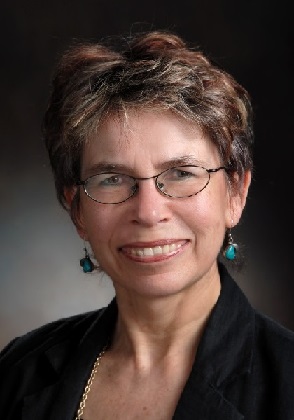
"Physical Play & Children's Digital Games"
Speaker: Krystina Madej
Date: 2017-01-19 16:45:00
Location: TSRB ballroom
GVU Center Brown Bag Seminar: GVU Brown Bag Lunch Series - Krystina Madej - "Physical Play & Children's Digital Games"
Speaker: Krystina Madej
Professor of the Practice
School of Literature, Media and Communication
No video.

"The Evolution from Static-3D Scanning to Dense Temporal-3D Motion Capture to Innovate the Next Wave of Exceedingly Functional, Comfortable, and Fashionable Wearable Technologies"
Speaker: Christopher Lane
Date: 2017-01-12 12:00:00
Location: TSRB - 1st Floor Ballroom
Abstract:
With the increasingly rapid-pace developments in Materials Science and communication platforms, today's manufacturers have the opportunity to revolutionize our wardrobe from pairing solitary garments together to wearing an interactive ensemble of clothing (and accessories) that enhances, and possibly improves, a person's every-day experience in the world. These advancements are challenging the well-established supply chain status quo to rethink generic apparel design based on an aggregation of fit models (mannequins). To move forward it will be vital for manufacturers to better understand and quantify anatomical shape to submillimeter precision from a functional standpoint as individuals move through their daily routines. My talk will chart 3dMD's voyage of discovery from our early pioneer work imaging young children to support 3D surgical and treatment planning to our development of the world's most sophisticated dense temporal-3D motion capture devices now being used to by leading manufacturers, teaching hospitals, and research institutions worldwide to document shape and update our understanding of shape change through human dynamics. My goal is to document 3dMD's voyage with case studies and examples to further stimulate the imagination on just what can be achieved in this exciting period of industrial innovation.
Speaker Bio:
With more than 40 years of experience in the IT industry, Lane has held senior technical and chief executive positions in globally-recognized high-tech and services companies, as well as serving as a board member for both privately and publicly held companies in the US and Europe. Following an early career in software engineering and as a consultant with a U.K. government agency focused on the promotion of IT, Lane joined Oracle, the world's largest business-to-business software company. During his six years with the company, he held VP positions in Europe and the U.S., including head of Consulting Operations. Lane then joined the IT team at EM Warburg, Pincus & Co., one of the world's leading venture capital investors. In 1994, Lane was appointed as CEO and president of TSW International, which he shaped to be the acknowledged market leader and visionary company in the Enterprise Asset Management market. Just prior to joining 3dMD, Lane held the position of COO at ECSoft, a European IT services provider. Lane co-founded 3dMD in 2000 with the goal of establishing a highly-reliable, non-invasive 3D technology platform for efficiently imaging people in 3D to a level of anatomical shape precision required to fuel growth in applications such as medical, biometrics, human factors, high-end fit apparel, and anthropometrics. For the past 17 years, Lane has personally spearheaded an R&D strategy that has resulted in 3dMD becoming the benchmark supplier of high-precision 3D and temporal-3D(4D) surface image capture solutions. To maintain the company's global benchmark status, Lane is actively involved with spearheading industry initiatives and 3dMD customer community to better understand real-world requirements and ever-changing environments.
No video.




